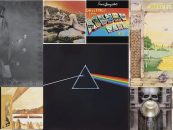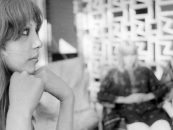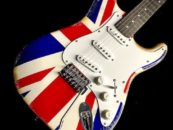 In any historical account of 1968, we are told that it was a volatile year. The news was dominated by the assassinations of Robert F. Kennedy and Dr. Martin Luther King, the escalation of the Vietnam War, the riots at the Democratic convention in Chicago, etc.
In any historical account of 1968, we are told that it was a volatile year. The news was dominated by the assassinations of Robert F. Kennedy and Dr. Martin Luther King, the escalation of the Vietnam War, the riots at the Democratic convention in Chicago, etc.
This tension was reflected to a great extent in the music we listened to—rock was getting more intense, louder, more political.
But not all of it. It was also the year when the so-called psychedelic sound, a.k.a. acid rock, began to give way to softer, back-to-basics music–from artists like Bob Dylan, the Byrds and The Band–that drew from country, folk and other roots music. A little peace and quiet in the music helped to balance out the craziness and chaos.More than anything, it was a year of diversity—the transition from AM radio and Top 40 singles to FM rock radio dominated by albums was by now in full swing, allowing artists to experiment more than they had previously, to play longer tunes, and for disc jockeys to introduce recordings that didn’t have to sell pimple cream in order to get played on the air.
It was an exciting year for rock—so much of what we listened to during that year still reverberates today, or at the very least still sounds vibrant.
We looked back at hundreds of albums released in 1968 and whittled the list down to the 50 that we think represent the cream of the year’s crop. Many of these titles remain cornerstones of any essential classic rock record collection, sounding as fresh now as when we first removed the vinyl from the shrink-wrapped album jacket.
Were there others? You bet! We welcome your input on what we should have included, and if you disagree with some of our choices, what we could have omitted.We’re not ranking them; they’re arranged alphabetically by artist. How many of the 50 do you own?
The Band—Music From Big Pink—Nowhere on the cover of the original album does it mention the name of the artist. But we soon found out that the five little known musicians were Dylan’s recent collaborators and that they had a lot to say on their own—in a way that no one else was at the time. (More about Big Pink here.)
The Beach Boys—Friends—It didn’t sell very well at the time, but this meditative collection has since become a favorite of many fans.
The Beatles—The Beatles (aka The White Album)—Their first double album was as much a collection of individual projects as a cohesive Beatles album, and their most stylistically diverse work.
Listen to an alternate early take of “Helter Skelter”
Jeff Beck Group—Truth—The former Yardbirds guitarist put together a stunning new band (hello, Rod Stewart and Ronnie Wood) and pointed the way toward what would come to be called hard rock.
Big Brother and the Holding Company—Cheap Thrills—Many have said that Janis Joplin quickly outgrew her original band, but their #1 album still crackles with raw electricity.
Related: The previous year saw killer debuts from many of California’s best bands
Blood, Sweat & Tears—Child is Father to the Man—Their horn-powered debut commingled rock, jazz, soul and folk, and although it was eclipsed commercially by its very different followup, the short-lived Al Kooper-led lineup is still treasured by many fans.
Mike Bloomfield/Al Kooper/Stephen Stills—Super Session—Three ace musicians who’d recently left high-profile bands kicked back in the studio and let it fly. The result paved the way for what would later be called the jam band.
Listen to “Season of the Witch” from Super Session
Buffalo Springfield—Last Time Around—They only made three albums in their brief time together, and while each is a gem, this finale includes some of their most durable work. Makes one wonder where they would’ve gone from there.
The Byrds—Sweetheart of the Rodeo—Major lineup changes and a shift of focus led to the creation of the album often considered the progenitor of the country-rock movement. Earlier in the year, The Notorious Byrd Brothers was also masterful. (More about Sweetheart of the Rodeo here.)
Canned Heat—Boogie With Canned Heat—They’ve been somewhat relegated to also-rans but for a while they were one of the most popular blues-rock bands around. Their second album showcased their songwriting, and also included the anthem-to-be “On the Road Again.”
Johnny Cash—At Folsom Prison—Already a country music legend, he was no stranger to playing prisons. The decision to record this particular gig turned him into an American icon for the remainder of his life. (More about the Folsom Prison album here.)
Cream—Wheels of Fire—Their third LP and first double, the half-studio/half-live collection expanded their stylistic reach and showcased their improvisational skills. By the end of the year they’d break up.
Listen to “White Room” from Wheels of Fire
The Doors—Waiting for the Sun—Their third album, and only chart-topper, it included the #1 single “Hello, I Love You” and dramatic new epics like “The Unknown Soldier” and the bluesy “Five to One.” (Our look back at the previous LP, Strange Days.)
Watch the Doors perform their huge hit at the Hollywood Bowl in 1968
Bob Dylan—John Wesley Harding—His first album of new material since his 1966 motorcycle accident, it was a toned-down, largely acoustic affair with a back-to-the-roots country feel. [Note: The album was actually released on Dec. 27, 1967, but as it had no chance to make an impact that year, we’re considering it a 1968 album.]
Electric Flag—A Long Time Comin’—Organized by guitarist Mike Bloomfield after he left the Paul Butterfield Blues Band, they melded Stax-style soul with rock. The horn section was killer and drummer Buddy Miles a major new discovery. (More about the Flag’s debut here.)
Fairport Convention—Fairport Convention—British folk-rock begins here, and so does the still-prolific career of guitarist-singer songwriter Richard Thompson. (Released in the U.S. in 1970, but released in the U.K. in 1968.)
Fleetwood Mac—Fleetwood Mac—Emerging from the hyperactive British blues scene, this new band was fronted by the guitar whiz Peter Green. Bigger things would come several years down the road.
Listen to “Hellhound on My Trail” from Fleetwood Mac’s debut album
Aretha Franklin—Lady Soul—She was mainly a singles artist, but her albums contained some hidden gems as well as the latest hits. This one reached #2 on the strength of smashes like “Chain of Fools” and “A Natural Woman.”
Grateful Dead—Anthem of the Sun—Following the amphetamine rush of their debut with this psychedelic patchwork of live and studio bits, the San Franciscans created an experimental work that’s utterly of its time. “The Other One” would remain in their setlist till the end.
Jimi Hendrix Experience—Electric Ladyland—The third (and final) release by the trio was a double album that greatly expanded their reach. Classics like “Voodoo Chile” and Dylan’s “All Along the Watchtower” were born here.
Incredible String Band—The Hangman’s Beautiful Daughter—The British psych-folk band was basically down to a duo by this time, and although they were never a huge commercial success in the U.S., they had enough followers to earn a spot at Woodstock the following year.
Iron Butterfly—In-a-Gadda-Da-Vida—Arriving just months after their debut, Heavy, it revolved along the side-long title track that virtually defined early hard-rock. Some rock fans despised it, but tens of millions bought it. (More about “In-a-Gadda-Da-Vida” here.)
Etta James—Tell Mama—She’d been a force in the R&B world for several years but on the fringe of the rock scene. Thanks to fans like Janis Joplin promoting her, she experienced a resurgence with this soul burner later in the decade.
Listen to Etta James sing “Tell Mama”
Jefferson Airplane—Crown of Creation—Their fourth studio album found the most successful of the San Francisco bands dialing back the experimentation of their previous release. Some of their most poignant and well-crafted tunes turned up on this classic.
Related: When the Airplane sang from a NYC rooftop
The Kinks—The Kinks Are the Village Green Preservation Society—The final release by the original quartet was the consummate portrait of a simpler English way of life that was fading into the history books.
John Mayall—Blues from Laurel Canyon—After introducing the world to Eric Clapton and Peter Green, the British blues patriarch put together a new band (which features another guitar discovery, Mick Taylor) and cut this collection heavily influenced by the Los Angeles lifestyle he’d soon embrace full-time.
Steve Miller Band—Children of the Future—Yet another new band to emerge from the ripe San Francisco scene, this blues-influenced team (which also featured Boz Scaggs) would have a long, lucrative life following this impressive debut.
Joni Mitchell—Song to a Seagull—The debut by this young Canadian singer-songwriter marked the arrival of a major new voice. Producer David Crosby kept it minimal, allowing the songs to speak for themselves.
Listen to Joni Mitchell’s “Song to a Seagull”
The Monkees— Head—Their second album of the year (following The Birds, the Bees and the Monkees) was the soundtrack to one of the wildest, weirdest rock films ever. Some truly bizarre tracks are nestled amidst gems like “Circle Sky” and “The Porpoise Song.”
Van Morrison—Astral Weeks—After going through a contractual battle with his previous label, the Irish soul bard settled for a while in Boston and fashioned this nearly stream-of-consciousness poetic masterpiece. Few got it at the time, but now it’s considered a landmark recording. (More about Astral Weeks here.)
Mothers of Invention—We’re Only In it for the Money—Frank Zappa and the band refined their satirical onslaught against American hypocrisy and the generation gap in one of the most finely crafted albums of his career. (More about We’re Only In It… here.)
Randy Newman—Randy Newman—Other artists had recorded his songs but this debut from the singer-songwriter heralded a major new talent with a unique writing style and singing approach.
Laura Nyro—Eli and the Thirteenth Confession—We’d heard her songs as recorded by the 5th Dimension and others, but on her second album, the songwriter truly came into her own as a performer as well.
Original Cast Recording—Hair—Most rock fans had little interest in Broadway musicals but Hair was something different altogether. A massive seller, it produced several songs that became hits for others as well.
Listen to “Aquarius” from the original Hair cast recording
Related: Top radio hits of 1968
Elvis Presley—Elvis (NBC TV Special)—He’d been written off as a has-been. Then came the 1968 comeback special that proved he still had the spark. The album released in connection with the show reinforced that truth. (More about the comeback special here.)
Quicksilver Messenger Service—Quicksilver Messenger Service—One of the last of the major San Francisco bands to sign a record deal, their debut showed that they excelled both at the short song format and in a psychedelic jam. (More about the QMS debut here.)
Otis Redding—The Dock of the Bay—He was already dead by the time the album came out, but in addition to the title hit it was filled with dynamic tunes that showed his range to full effect.
The Rolling Stones—Beggars Banquet—After Their Satanic Majesties Request, the Stones dialed back the weirdness and went back to the basics with one of the finest albums of their long history.
Diana Ross & Supremes/The Temptations—Diana Ross & the Supremes Join the Temptations—The two reigning Motown groups collaborate and the resulting LP brings out the best in each. The #2 single “I’m Gonna Make You Love Me” still sounds great!
Listen to “I’m Gonna Make You Love Me”
Simon and Garfunkel—Bookends—They had two huge hits this year, the soundtrack from The Graduate (which of course introduced “Mrs. Robinson”) and this gem, which featured such timeless tunes as “America” and “At the Zoo.”
Related: 13 albums reached #1 in 1968
Sly and the Family Stone—Life—Neither this nor its predecessor earlier in the year, Dance to the Music, were huge sellers, but they served notice that soul and rock were finding common ground in an exciting new way.
Small Faces—Ogden’s Nut Gone Flake—It’s still considered a cult favorite by some—it only rose to #158 in the U.S.—but for its fervent fans it’s one of the great Mod classics of the British era.
Soft Machine—The Soft Machine—Whether it was psychedelic, prog or something else altogether, the debut by these British virtuosos made for some very intense listening.
Spirit—The Family That Plays Together—Both this sophomore effort by the Southern Californians, and its eponymous predecessor, introduced an innovative outfit that featured a guitar whiz, Randy California, and his stepfather, drummer Ed Cassidy.
Steppenwolf—Steppenwolf—If they had only come up with “Born to Be Wild” (the fifth track on side one), they’d deserve every honor in rock, but the entire album is superb.
Related: “Born to be Wild” and Easy Rider, a perfect match
Ten Years After—Undead—The British blues-rockers smartly released this live set as the followup to their debut. Many a rock fan was left slack-jawed at the agility of lead guitarist Alvin Lee, especially on the closing jam, “I’m Going Home.”
Three Dog Night—Three Dog Night—The vocal trio of Cory Wells, Chuck Negron and Danny Hutton were brilliant interpreters, both individually and in harmony. Their take on Harry Nilsson’s “One” is the definitive version.
Traffic—Traffic—Following up the decidedly psychedelic debut Mr. Fantasy, this gem focused more on the writing and singing of Dave Mason, whose “Feelin’ Alright” is one of the highlights. Of course, Steve Winwood was still in his prime as well. (A look at Traffic’s debut here.)
Velvet Underground—White Light/White Heat—The second album by the New York underground band took them even further out of the mainstream than their debut. The 17-minute closer “Sister Ray” was an improvised, droning meditation on the underbelly.
The Zombies—Odessey and Oracle—The band was famously already broken up by the time this masterwork (recorded in 1967) was released. How sad it would have been if we’d been deprived of its perfection. (Our review of the Odessey and Oracle tour here.)
Watch the Zombies perform “Time of the Season” live in 2011







9 Comments so far
Jump into a conversationIn 1968 the Mellotron replaced the orchestra for the Moody Blues on In Search of the Lost Chord
I don’t know what I would take off, but yes, The Moody Blues’ In Search of the Lost Chord belongs on this list. For all their accolades they never were more experimental than they were on this album. Both of its time and timeless.
One album that should have been on this list is by The Night Tripper himself, Dr. John, who unleashed his voodoo with his album, Gris-Gris, which has “I Walk on Guilded Splinters”, later done by Humble Pie and others.
In addition to In Search Of The Lost Chord, I would have to include A Saucerful Of Secrets!
The Moody Blues In Search of the Lost Chord should be included. It was far ahead of it’s time. Heavily hallucinagentic influenced. Much like Quicksilver but much better production and polish
The rest of the list is good. The way I remember it.
Thanks for a great list reminds me of the basement parties and someone would bring a new album to consider. Gotta find about 6 CD’s and take a time machine back to 68. Spirit,Airplane,Traffic,10 Years After,Quicksilver,Sly Stone etc.
The Moody Blues : OF COURSE !!!
Hi Jeff, As a tangent, my friend who has an Internet radio show called Sounds of Blue, has you listed in his list of folks who’s birthday it is today, so Happy Birthday.
soundsofblue.com
That’s great, and thank you!